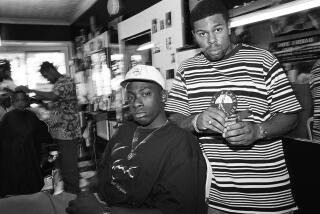Harvey Fuqua dies at 80; singer, songwriter, producer and record executive
- Share via
Harvey Fuqua, a musical multi-tasker whose career with the prominent 1950s vocal group the Moonglows was a prelude to his association with Marvin Gaye, the Spinners and other R&B stars in the 1960s and ‘70s, died of a heart attack Tuesday in a Detroit hospital, a family spokeswoman said. He was 80.
A singer, songwriter, producer and label executive, Fuqua also collaborated with Etta James, New Birth, Smokey Robinson, the Supremes, Tammi Terrell, Junior Walker and the All Stars and Stevie Wonder, and, in the disco era, Sylvester and the Weather Girls.
The Fuqua-Gaye team made a major comeback in 1982 when they ended a long separation with the album “Midnight Love” and its Grammy-winning hit “Sexual Healing.”
“He was highly ambitious and he was highly competent,” said Robert Pruter, who chronicled the Moonglows in his 1996 book “Doowop: The Chicago Scene.”
“I think he was very good at knowing the music business and knowing how to succeed in the music business. He was not the greatest singing talent in the Moonglows, but he was the real leader of the Moonglows. The lead singer was Bobby Lester…. Harvey you could say was the architect of the success of the Moonglows.”
Born in Louisville, Ky., on July 27, 1929, Fuqua took to music early. His uncle, Charlie Fuqua, was a member of the popular vocal group the Ink Spots, and Harvey spent much of his time singing on street corners with friends, including Lester, a schoolmate.
After serving in the Army, Fuqua and Lester formed a scat-style vocal group in Cleveland. The Crazy Sounds were singing in a nightclub in 1952 when they were encountered by famed disc jockey Alan Freed. A multi-tasker himself, Freed became their manager, changed their name to the Moonglows and recorded them for his Champagne label.
They signed with Chicago’s Chess Records in 1954, and “Sincerely” quickly became a No. 1 R&B hit and made the Top 20 on the pop chart. The song — written by Fuqua with a co-credit to Freed — also was made into a No. 1 pop hit by the McGuire Sisters, and has been recorded by numerous performers over the years.
Fuqua reconfigured the Moonglows in 1959, enlisting the members of the Washington-based Marquees, including Gaye. Now called Harvey and the Moonglows, the group had another hit with “Ten Commandments of Love.”
After leaving the Moonglows, Fuqua and his protege Gaye moved to Detroit and worked with Anna Gordy, a sister of Motown founder Berry Gordy. Fuqua produced records by Lamont Dozier and Johnny Bristol, both of whom would become major creative forces at Motown. He conducted intensive rehearsals at a space owned by another Gordy sister, Esther, and he married another, Gwendolyn.
Fuqua also was producing tracks with Etta James for Chess, and he started his own companies, Tri-Phi and Harvey, in 1961. He soon tired of competing as a small independent, and in 1963 the two labels were acquired by Motown, along with such talent as the Spinners, Bristol, Junior Walker and the All Stars and Shorty Long.
Fuqua also brought Gaye to Motown, where he started as a session drummer before emerging as one of the most visionary artists in all of pop music.
At Motown, Fuqua became the head of artist development, helping the label’s acts hone their live performances. He also had a hand in a range of the label’s records, producing Wonder’s “Yester-Me, Yester-You, Yesterday,” co-writing the Supremes’ “Someday We’ll Be Together” and co-producing some of Gaye’s classic duets with Terrell: “Ain’t No Mountain High Enough,” “Your Precious Love,” “If This World Were Mine.”
Fuqua left Motown in 1969 and struck a production deal with RCA, where he worked with the R&B group the Nitelighters and New Birth. Later in the decade he produced popular dance records by San Francisco-based Sylvester, including “Dance (Disco Heat)” and “You Make Me Feel Mighty Real.”
Gaye, meantime, had begun the ‘80s by cutting his ties to Motown and moving to Europe amid tax problems and a drug addiction. The singer was at low ebb when he started recording an album.
“I read in Billboard where he was doing an album in Belgium,” Fuqua said in a 1995 interview. “So I picked up the phone, got the studio and he said, ‘Man, I’m so glad you called me. I was just too ashamed to call you because I haven’t spoken to you for six months, but I really need help.’ And I was right on the plane when he said that, ‘cause, you know, I love him anyway.”
The result was the album “Midnight Love.” Released by Columbia Records and sparked by the single “Sexual Healing,” it returned Gaye to the charts for the first time in five years and triggered a major career comeback for the mercurial singer.
“He became like a new man,” Fuqua said, “because that’s what he wanted most of all, to make a comeback and show people that he wasn’t down and out.”
The Moonglows were inducted into the Rock and Roll Hall of Fame in 2000, the same year that Fuqua founded the Resurging Artist record label and released a solo album. He also was a board member of the Rhythm and Blues Foundation. A statement from the Motown Alumni Assn. said that he was working with the inspirational group S.T.A.R.S. at the time of his death.
Fuqua had been living in Las Vegas and Rancho Mirage. A family spokeswoman said Wednesday that a list of survivors was being compiled.
Cromelin is a freelance writer.
More to Read
The biggest entertainment stories
Get our big stories about Hollywood, film, television, music, arts, culture and more right in your inbox as soon as they publish.
You may occasionally receive promotional content from the Los Angeles Times.










